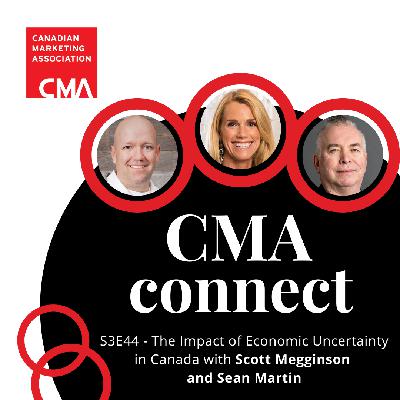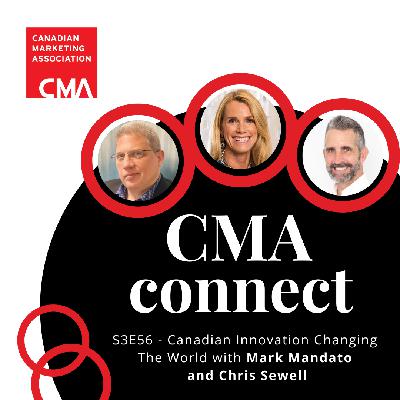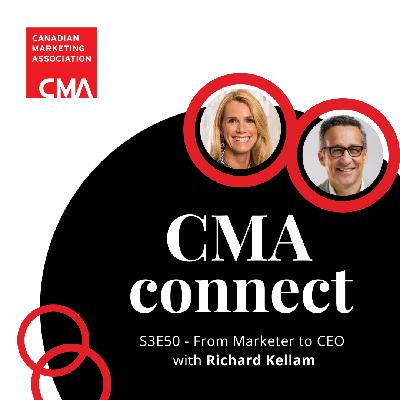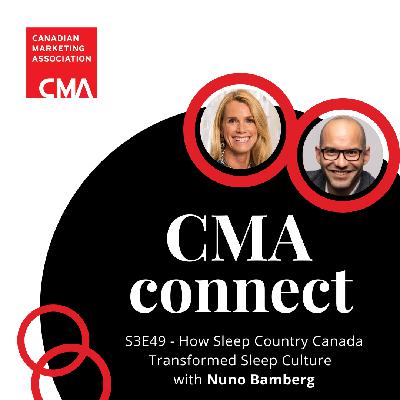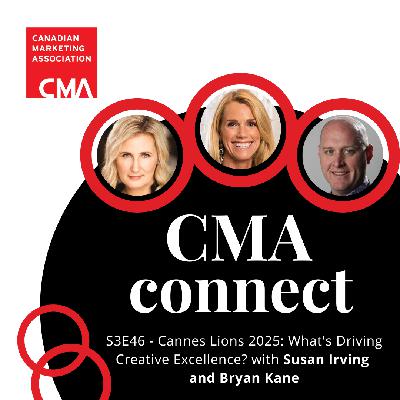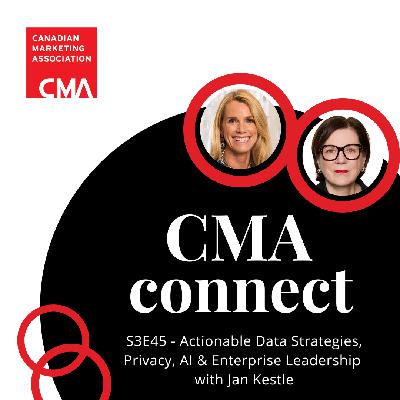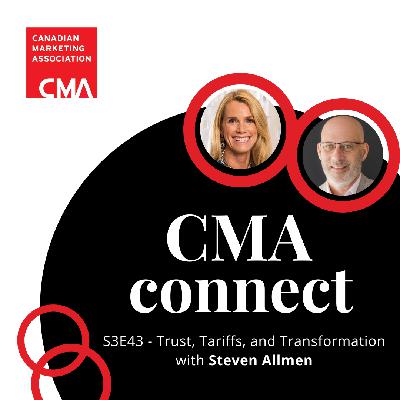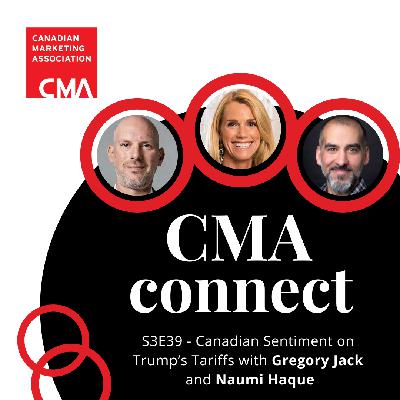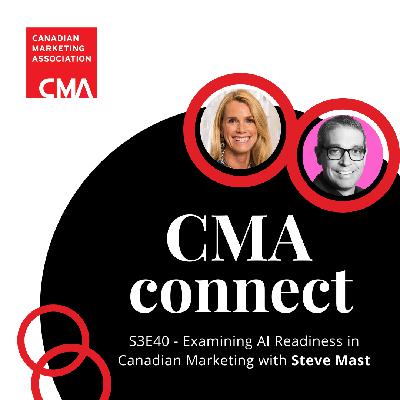EP44 - The Impact of Economic Uncertainty in Canada with Scott Megginson and Sean Martin
Description
How are tariff disputes and economic uncertainty reshaping Canadian consumer behaviour? In this episode of CMA Connect, the CEO of the CMA, Alison Simpson, welcomes Scott Megginson, President of Kantar Canada and Sean Martin, General Manager at Numerator. Their conversation explores the nuances of the "Buy Canadian" sentiment, its impact on domestic and international brands, and provides strategic advice for marketers navigating this complex landscape.
00:00:01 :18 - 00:00:22 :19
Presenter
Welcome to CMA Connect, Canada's marketing podcast, where industry experts discuss how marketers must manage the tectonic shifts that will change how brands and businesses are built for tomorrow, while also delivering on today's business needs. With your host, CMA CEO, Alison Simpson.
00:00:22 :21 - 00:00:46 :03
Alison
In today's episode, we're tackling a topic that's been dominating headlines and boardroom discussions alike. The shifting landscape of Canadian consumer behaviour in the wake of recent tariff disputes, and the global political and economic uncertainty. Joining me today are two of Canada's top insights and analytics leaders. Scott Megginson, president of Kantar Canada, is a veteran with over 30 years of market research.
00:00:46 :05 - 00:01:14 :17
Alison
He's held significant roles at Angus Reid Group, Warner Lambert Canada, PepsiCo Canada and has led Kantar Canada for the past 15 years. Scott, also a regular industry speaker, the past Chair of Queen's University Dean's Council of Arts and Science and the founding president of the Canadian Advisory Council for the Insights Association. Joining Scott and me today is Sean Martin, general manager at Numerator, and a trusted advisor to many of the largest companies across North America.
00:01:14 :19 - 00:01:35 :09
Alison
Sean also started his career working for leading brands and held senior roles at Mars, GSK and Procter Gamble before taking the lead role at Numerator, where he's led the Canadian business for five years. Scott can be sharing key insights from what Kantar is seeing about Canadians perspective and planned behaviours, and how they're changing as a result of the chaos that's emerging from south of the border.
00:01:35 :11 - 00:02:01 :23
Alison
He's also covering important considerations for brands. Sean will complement this by highlighting the actual ways that Canadians' behaviours have changed when it comes to their purchase decisions and actions. Together, the three of us are diving into how Canadian consumers are responding to the call to buy Canadian, as well as the risks and opportunities for both domestic and international brands, and the very delicate balance between patriotic messaging and authentic brand positioning.
00:02:02 :01 - 00:02:16 :01
Alison
From the pitfalls of maple washing to the surprising resilience of shopping habits, our guests will share their latest research and offer valuable advice for marketers navigating through these turbulent waters. Welcome Scott and Sean, it is an absolute pleasure to have you here today.
00:02:16 :02 - 00:02:17 :02
Scott
Thank you Alison.
00:02:17 :04 - 00:02:19 :09
Sean
Thank you Alison. Wonderful to be here.
00:02:19 :11 - 00:02:28 :17
Alison
Now, I'd love to have you both answer my first question. Can you each share what your organizations are doing to track Canadian consumer behaviour? And, Scott, why don't you kick things off?
00:02:28 :22 - 00:02:29 :15
Sean
We've been looking
00:02:29 :15 - 00:02:59 :14
Scott
at different ways to to really understand what Canadian consumers are feeling, because there's just there's so much out there and there's so much in chat and social and everywhere else. And that's one of the first things that we started looking at, was, using our, we call it DX analytics, but really, analyzing search and social signals to get a good understanding of how Canadian consumers are seeing brands.
00:02:59 :15 - 00:03:28 :15
Scott
I mean, do they see them as Canadian or not Canadian? With all the confusion of being in Canada and product of Canada and such, but also the sentiment, and that's been giving us some useful insights, both for Canadian brands and for multinationals. Secondly, there's a lot of polling and a lot of attitudinal data floating around out there, but we wanted to go a little bit deeper, and we've been engaging our Canada Monitor team to really look at the trends and how the values have shifted underneath that.
00:03:28 :17 - 00:03:46 :21
Scott
And we've just launched a global study. We call it Barometer. And we did this during Covid as well. But it's a global study that we're going to have results for pretty soon and we'll be sharing them out with people and how consumers in different markets are really seeing tariffs and and what their responses are and with some of their shopping habits.
00:03:46 :23 - 00:04:10 :19
Scott
And the third piece I think is important. It's been going back what we've learned. I mean, we've been through different crises before. I mentioned Covid. We've gone through different financial crises in the past as well. And we have a lot of learnings for brands and for advertising that we've gone back to look at and pull the dust off a bit, but also try to see which are relevant to bring back to the market for consideration.
00:04:10 :20 - 00:04:13 :23
Scott
So those are your three areas for us basically.
00:04:14 :01 - 00:04:27 :01
Alison
That's great. Scott. It will be fascinating to see how the global study around how countries around the world are reacting to tariffs. That will be very valuable insights for our listeners and certainly for Canadian brands and businesses. And Sean, what about you?
00:04:27 :02 - 00:04:56 :07
Sean
Yeah. Thanks, Alison. For for those that you don't know Numerator we are the largest single source data lake in Canada. And so in a nutshell we collect 12 million receipts from 165,000 Canadians, including Amazon purchases, Walmart purchases as well as hundreds of demographics. And we put it all into our data lake. And with that, we seek to understand what people are actually doing with their purchases and how their opinions are changing, how their sentiment changes, and how it's impacting purchases.
00:04:56 :09 - 00:05:29 :15
Sean
As it specifically relates to this, this Buy Canadian and tariff phenomenon, we've gone ahead and segmented our panel based on shoppers; claimed sentiment around their intentionality. Therefore, we now have segments for people that claim to buy Canadian, who want to avoid U.S. retailers or avoid U.S. brands. And so we're working with our clients to not only understand how their consumers are thinking about it, where they sit in this range, but also tracking their actual purchases and seeing if the sentiments they claim are results in real actions at the store.
00:05:29 :17 - 00:05:54 :10
Alison
And that's a really powerful part of the conversation we can have today. It's one thing to understand how Canadians across the country are feeling and planning to behave, but to actually be able to back that up with actual change in behaviour will make for a very fascinating conversation. So thank you both for being here today. Now, Scott, what is your research showing when it comes to Canadian sentiment towards Canadian brands versus American brands versus international brands?
00:05:54 :12 - 00:06:20 :22
Scott
This is an interesting one, Alison. And we're just starting to get into it. I'll share an example from coffee. What's more Canadian than coffee, right? But we're now digging into, ten different categories and different brands across this. And the first learning was that it's not that black and white, and it's not a clear correlation between how consumers see brands.
00:06:20 :22 - 00:06:38 :20
Scott
So let's call it provenance or how Canadian a brand is, or created a Canadian index, you know, from 0 to 100 of how Canadian your brand is seen. And then we looked at sentiment as well. So positive or negative. So what's associated with that? And we're getting this from search and social like I mentioned before. And it was really interesting.
00:06:38 :21 - 00:06:58 :12
Scott
Let's take a case of a few different brands here. And you have a brand like Second Cup. And if you look at it, Second Cup has become even more Canadian in association recently. I think a lot of that had to do with This Hour Has 22 Minutes. They have that viral thing and that's one of the brands that they called out.
00:06:58 :14 - 00:07:24 :08
Scott
And, but we saw that their sentiment hadn't changed versus a year ago. Now meanwhile, it has, because back in the end of last year, their sentiment took a nosedive due to some, let's just say, political statements of one of their franchisee's owners. And it was, it made the news and it took a dive. But what's happened to Second Cup is they have, shot right back up to where they were.
00:07:24 :08 - 00:07:50 :10
Scott
So they've recovered their sentiment and been seen as more Canadian. Then you have the big brands like Tim Hortons, which is, with all the scrutiny, is being seen as a little less Canadian as people look into ownership. But their sentiment hasn't changed that much. People love their Timmie's. And there's almost the same from McDonald's. I mean, McDonald's was never considered a Canadian brand, but their sentiment hasn't changed much, meaning,
00:07:50 :11 - 00:08:21 :09
Scott<br

